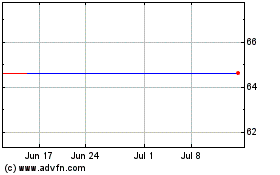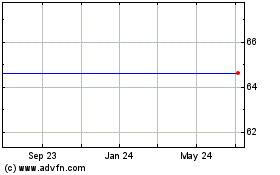Eurozone PMI Data Shows Stronger-Than-Expected Business Activity
November 23 2016 - 6:20AM
Dow Jones News
Eurozone businesses had their most active month this calendar
year in November, and raised their prices for the first time in
more than a year, according to a survey of purchasing managers
released Wednesday.
The pickup in activity suggests the eurozone's modest economic
recovery has gained some momentum as 2016 draws to a close, and is
another indication that rising levels of political uncertainty are
having little impact on the behavior of businesses or
households.
IHS Markit said its composite Purchasing Managers Index for the
eurozone's manufacturers and service providers, which is based on a
survey of 5,000 companies, rose to 54.1 from 53.3 in October, its
highest level since December of last year and above the 53.4
consensus forecast of economists polled by The Wall Street Journal
last week. A reading above 50.0 signals an increase in activity,
while a reading below signals a decline.
The survey suggests that higher levels of activity will be
sustained over coming months, with new orders also rising at the
fastest pace this year.
"Increasing numbers of firms are boosting capacity as a result
of the order book backlog, leading to the joint-largest increase in
employment seen this side of the global financial crisis," said
Chris Williamson, IHS Markit's chief business economist.
According to the survey, businesses raised their prices for the
first time since August 2015, an encouraging development for the
European Central Bank as it struggles to boost inflation to its
target of just under 2% from 0.5% in October.
A separate survey released Tuesday by the European Commission
found that consumers became more optimistic about their prospects
in November, shrugging off the uncertainties created by the
election of Donald Trump as the next U.S. president and the
prospect of political turbulence across their own continent.
Mr. Trump's election has raised questions about whether the U.S.
will continue to extend the unconditional security guarantee that
has underpinned European prosperity since World War II. It also
highlighted the possibility that antiestablishment views could
receive increased support in a series of coming votes across the
eurozone.
France, Germany and the Netherlands will hold elections in 2017,
with French President Franç ois Hollande and German Chancellor
Angela Merkel under pressure from freshly energized populist
parties, as well as more traditional rivals.
More immediately, Italian Prime Minister Matteo Renzi has
pledged to resign if voters reject key constitutional changes that
aim to slim down the country's legislature and speed up lawmaking
in a Dec. 4 referendum.
Some economists continue to expect activity will weaken in the
early months of next year as political worries bite, and most
expect members of the ECB's governing council to announce a
continuation of their bond buying program beyond its scheduled end
in March when they next meet on Dec. 8.
"We suspect that growth will slow next year as political
uncertainty and a temporary rise in inflation weigh on domestic
demand," said Jennifer McKeown, chief European economist at Capital
Economics. "Mindful of these risks, we expect the ECB to announce a
six-month extension of its Asset Purchase Programme at the current
pace in December and think that tapering is a long way off."
The eurozone economy grew at an annualized rate of 1.4% in the
three months through September. Economists said the composite PMIs
for October and November point to an acceleration in growth to
between 1.6% and 2% in the final quarter.
Write to Paul Hannon at paul.hannon@wsj.com
(END) Dow Jones Newswires
November 23, 2016 06:05 ET (11:05 GMT)
Copyright (c) 2016 Dow Jones & Company, Inc.
IHS Markit Ltd. (NASDAQ:INFO)
Historical Stock Chart
From Mar 2024 to Apr 2024

IHS Markit Ltd. (NASDAQ:INFO)
Historical Stock Chart
From Apr 2023 to Apr 2024
